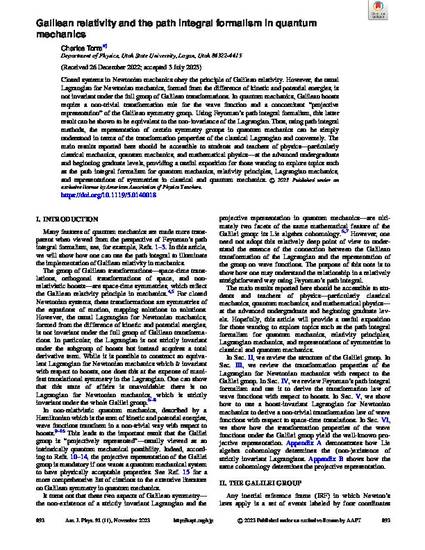
Article
Galilean Relativity and the Path Integral Formalism in Quantum Mechanics
American Journal of Physics
(2023)
Abstract
Closed systems in Newtonian mechanics obey the principle of Galilean relativity. However, the usual Lagrangian for Newtonian mechanics, formed from the difference of kinetic and potential energies, is not invariant under the full group of Galilean transformations. In quantum mechanics Galilean boosts require a non-trivial transformation rule for the Schrodinger picture wave function and a concomitant “projective representation” of the Galilean symmetry group. Using Feynman’s path integral formalism this latter result can be shown to be equivalent to the non-invariance of the Lagrangian. Thus, using path integral methods, the representation of certain symmetry groups in quantum mechanics can be simply understood in terms of the transformation properties of the classical Lagrangian and conversely. The main results reported here should be accessible to students and teachers of physics – particularly classical mechanics, quantum mechanics, and mathematical physics – at the advanced undergraduate and beginning graduate levels, providing a useful exposition for those wanting to explore topics such as the path integral formalism for quantum mechanics, relativity principles, Lagrangian mechanics, and representations of symmetries in classical and quantum mechanics.
Keywords
- Galilei group,
- Galilean relativity,
- Path integral,
- Lagrangian symmetry,
- projective representation,
- lie algebra cohomology
Disciplines
Publication Date
2023
Citation Information
Charles G Torre. "Galilean Relativity and the Path Integral Formalism in Quantum Mechanics" American Journal of Physics (2023) Available at: http://works.bepress.com/charles_torre/97/
Creative Commons license

This work is licensed under a Creative Commons CC_BY-NC-ND International License.
